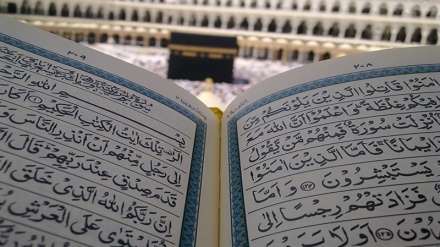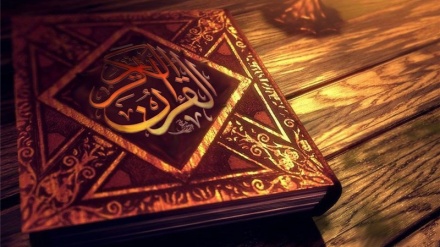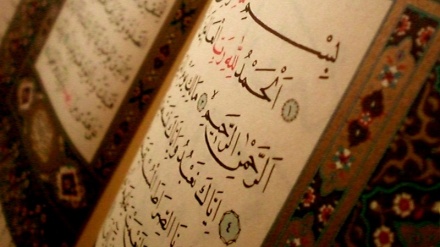Path towards Enlightenment (1036)
Welcome to our latest episode of “Path towards Enlightenment”, which is an endeavour to make you and us familiar with an easy and fluent explanation of God’s Final Scripture to all mankind, the holy Qur’an that was revealed to the Last and Greatest of all Messengers, Prophet Mohammad (blessings of God upon him and his progeny).
As you know a couple of weeks ago we started explanation of “Surah Ma’arej” – the number 70 in the serial order of compilation of the holy Qur’an – which has 44 Ayahs and was revealed in Mecca, although according to exegetes, some of its Ayahs were revealed in Medina. The title of the Surah derives from the word “Ma’arej” mentioned in Ayah 3 regarding the places of ascent or lofty stations where by the permission of the Almighty Creator angels can ascent. The Surah focuses on the Day of Resurrection and warns the polytheists and disbelievers of the dire consequences of their lack of faith, while defining the characteristics of the peoples of Paradise and Hell. The opening Ayahs concern the sending down of torments in this world such as the one that befell a denier of the Divinely-designated Wilayah or Leadership of the Prophet’s Immaculate Cousin and Son-in-Law, Imam Ali ibn Abi Taleb (AS).
We continue from where we had left you last week and here are Ayahs 19, 20, 21, 22, and 23:
“Indeed man has been created greedy:
“Anxious when an ill befalls him;
“And niggardly when good comes his way;
“Except the prayerful;
“Those who are preserving in their (ritual) prayers;”
If you remember, last Friday in our previous episode of Path towards Enlightenment while explaining the preceding Ayahs, we said there is no escape from Divine punishment for those who continue their evil ways and indulge in deviated beliefs even when given ample time for repentance. We also said there is no harm for believers in earning money or acquiring wealth through lawful means, but after meeting one’s needs, this should be spent in the way of Allah and the welfare of the needy.
The Ayahs that we recited to you now mean to say that human beings – especially those of weak faith or the faithless – are greedy and impatient by nature, to the extent that they are irritable when some ill befalls them and become niggardly when something good comes their way, except those who are firm in belief, constantly pray to God Almighty, and are diligent and steadfast in performing the ritual prayers.
From these Ayahs we learn that:
- Covetousness is the root of many problems and misbehavior.
- Impatience and irritation in the face of hardships, coupled with niggardliness when blessed with wealth and welfare, are the signs of people of weak faith and the faithless.
- In contrast, the true believers, irrespective of whether they are rich or poor, are always cognizant of God Almighty, punctually pray to Him, and diligently perform the ritual prayers without feeling any anxiety or being greedy in worldly affairs
Now we invite you to listen to Ayahs 24, 25, 26, 27, and 28 of the same Surah:
“And in whose wealth there is a known right;
“For the beggar and the deprived;
“And who affirm the Day of Judgement;
“And those who are apprehensive of the chastisement of their Lord;
“Indeed no one can be secure from the punishment of their Lord.”
Among the characteristics of the true believers is that they are well aware of the rights of others in the wealth God has bestowed them, which is not exclusively theirs but others also have a share in it, such as the beggars who ask and the needy who might not ask, especially the poor kith and kin. Thus the well-off true believers pay both the obligatory Islamic taxes such as Khoms and Zakaat, as well as the recommended grants to those deserving of such payments among the family and in the society.
Another characteristic of the true believers is their firm belief in the Day of Resurrection long after death for the final judgement when the Almighty Creator will recompense all in a fair manner. Out of modesty and humbleness, however, these virtuous people are not content with whatever good works they may have done, and are always in awe of the chastisement of the All-Merciful Lord. Indeed no one can feel secure of the chastisement of God Almighty, since it is not the quality of our good deeds, but His Infinite Compassion which rewards us with the bliss of Paradise, while the fire of Hell is the lot of the insincere, the arrogant, the unrepentant, the oppressors, the disbelievers, and the like.
The Prophet’s Vicegerent and First Infallible Successor, Imam Ali ibn Abi Taleb (AS), in his admonitions to one of his children, has said:
“O my child! Stand in awe before God Almighty such that even if you happen to have done all the righteous deeds in this world... He may forgive your faults.”
From these Ayahs we learn that:
- A true believer is in constant communion with the Almighty Creator and fully aware of the rights of others in his/her wealth, especially of the poor and the needy, interacts positively with fellow humans.
- In addition to the obligatory Islamic taxes of Khoms and Zakaat for the well-off, one should not consider a favour for helping others, but consider it a blessing of God to be the source of welfare for kith, kin, and the society.
- Belief in the Day of Resurrection and the Final Judgement is the key to salvation, but we should always be in awe of the Majesty of the All-Merciful Lord, since it is His compassion, not the quality of our deeds, that saves us from punishment.
In conclusion of this week’s episode of Path towards Enlightenment, here are Ayahs 29, 30, 31, 32, 33, 34, and 35 of Surah Ma’arej:
“And those who guard their private parts;
“Except from their spouses and those whom their right hand possess (lawful women), for then they are not blameworthy;
“But whoever seeks beyond that – it is they who are the transgressors;
“And those who keep their trusts and covenants;
“And those who are observant of their testimonies;
“And those who are watchful of their prayer;
“They will be in gardens, held in honour.”
The source of many a sin, including serious criminal cases, is lust, and thus the emphasis on chastity and the guarding of one’s private parts, with the freedom to have legitimate spouses for fulfillment of the natural desire. Other than this, that is, illicit relationships with the opposite gender, is transgression and sin. Islam plans a sound and healthy society based on morals, and at the same time strictly forbids celibacy or suppression of the natural desire, as practiced by monks and nuns on the pretext of chastity, which is often violated.
Among the other characteristics of the true believers is to honour promises, trusts and covenants, including the vital issue of Divinely-decreed leadership of the Prophets and the Imams, as well as provide correct testimonies in order to protect the rights of the individuals and the society, while being mindful of the ritual prayers and acts of worship. Such people are entitled to the bliss of Paradise.
These Ayahs teach us that:
- Islam is the way of moderation and it neither suppresses natural desires nor allows unbridled freedom that violates the rights of others and leads to sins.
- Trusts, covenants, and pledges must be honoured, including adherence to God-oriented leadership, while bearing correct testimony in both religious and social matters, without concealing facts.
- The proper observance of the ritual prayers is the key to Paradise.
RM/AS/SS


